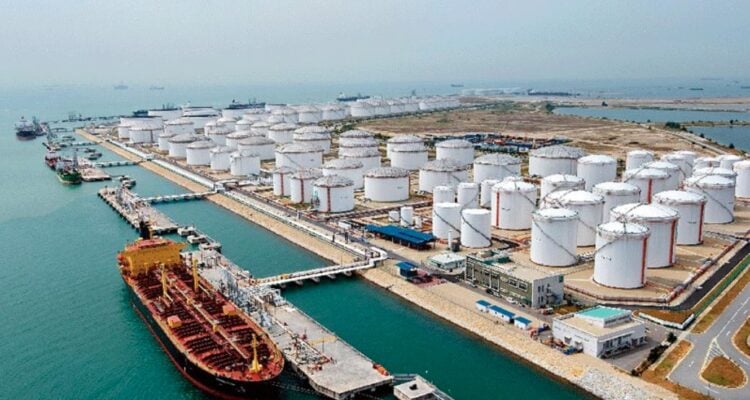Iran remains heavily dependent on oil revenues, which constitute 60-70% of its state budget.
By Yaakov Lappin, JNS
A series of recent American sanctions targeting Chinese petroleum facilities serves as a reminder of China’s critical role in sustaining Iran economically through the massive purchases of oil.
This trade, facilitated by a shadowy network of tankers, front companies, and transactions, helps provide Tehran with the financial means to fuel regional instability and fund terrorist proxies, prompting renewed American efforts to sever the connection.
The financial lifeline provided by Chinese purchases is critical for Tehran.
According to Danny (Dennis) Citrinowicz, a senior research fellow at the Tel Aviv-based Institute for National Security Studies (INSS) and the former head of the Iran Branch at the IDF’s Military Intelligence Research and Analysis Division, Iran remains heavily dependent on oil revenues, which constitute 60-70% of its state budget.
Citrinowicz told JNS recently that Iran lacks any real ability to diversify its income and that it suffers from aging energy infrastructure, making it difficult for Iran to utilize its own energy potential.
Hence, he said, “Any damage to oil production [exports] to China, which is the only country to which Iran exports oil in such quantities, will constitute a dramatic blow to the Iranian economy.”
Throughout years of living under sanctions, Iran has dramatically improved its evasion capabilities, particularly in the oil sector, Citrinowicz explained. Tehran established a “shadow fleet” of tankers that receive oil from Iranian vessels via ship-to-ship transfers, he added.
These shadow tankers frequently disable their Automatic Identification System (AIS) transponders to evade tracking until they reach destinations like China, often utilizing secluded ports.
But, according to Citrinowicz, the United States has also improved its detection methods, primarily by sanctioning the shadow fleet tankers and the Iranian producers in addition to increasingly targeting the recipients, such as the Chinese buyers.
Nevertheless, he cautioned, a significant limitation exists. Washington has refrained from physically intercepting tankers departing Iran due to fears of triggering a wider military escalation, Citrinowicz pointed out.
This allows the physical transport of oil to continue despite the financial restrictions.
“In the context of the current [nuclear] negotiations, the US sees here an excellent opportunity to apply maximum pressure on Iran,” he added.
On April 10, the US State Department announced sanctions on a China-based crude oil storage terminal operator, accusing it of “knowingly engaging in a significant transaction for the acquisition of crude oil from Iran,” according to a State Department fact sheet.
It noted the terminal received Iranian oil via previously sanctioned tankers on at least nine occasions between 2021 and 2025.
In addition, the US targeted three vessel management companies and identified two vessels as blocked property involved in transporting Iranian petroleum, primarily to China.
On April 16, the US Treasury Department imposed sanctions on a Chinese refinery it accused of buying over a billion dollars of Iranian oil, adding that the funds helped support the Iranian regime and its assistance for terrorist organizations.
Some of the petroleum reportedly came from a front company belonging to the Iranian Islamic Revolutionary Guards Corps. Iranians could return to sea terrorism of the type they engaged in 2019.
Max Meizlish, a senior research analyst at the Washington D.C.-based Foundation for Defense of Democracies, stated, “China is coming under increased pressure for supporting Iran’s illicit oil economy. US sanctions should also target the Chinese Communist Party officials, regulators, and state-owned entities responsible for facilitating these dealings.”
“Make no mistake,” he said, “CCP officials are implicated in the flow of Iranian oil and that presents a significant sanctions risk for officials in Beijing. China must either abandon its support for Iran’s illicit oil economy or face a wave of increasingly isolating sanctions.”
Jack Burnham, who is also an FDD research analyst, added that “China’s purchases of Iranian crude directly fuel Tehran’s attacks against Israel and the United States while showcasing the strength of an emerging ‘Axis of Aggressors’ bent on undermining U.S. national security.”





